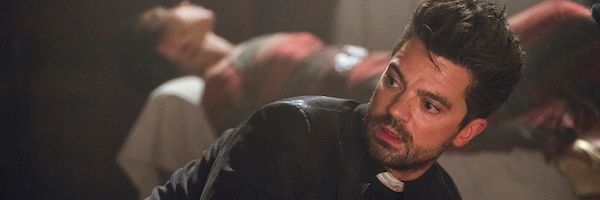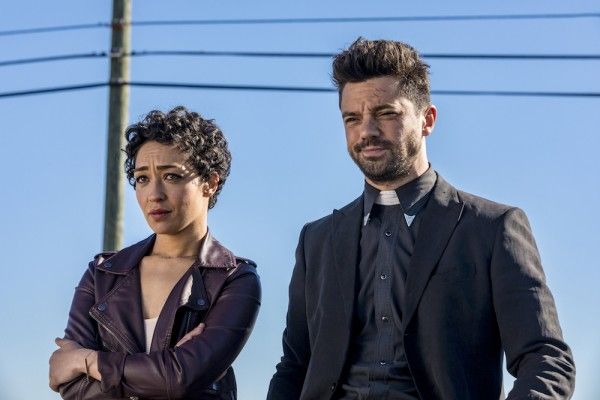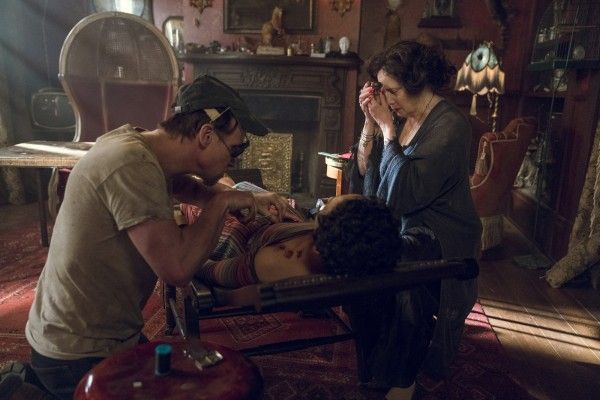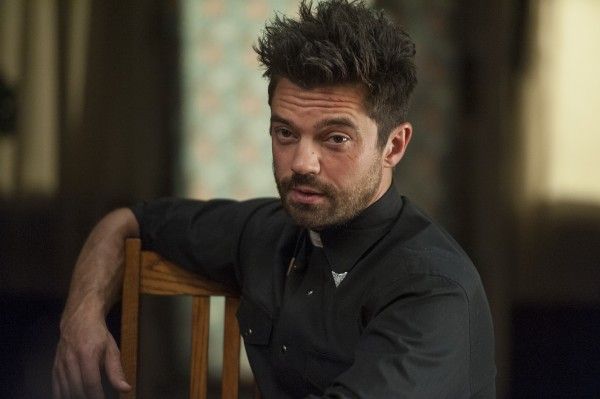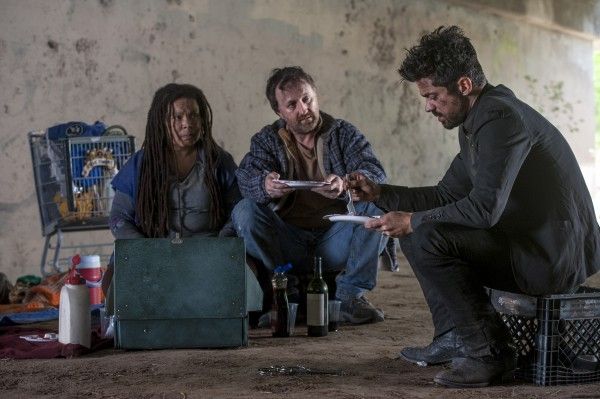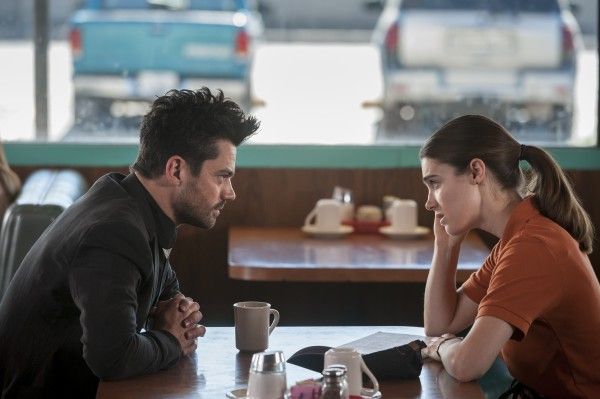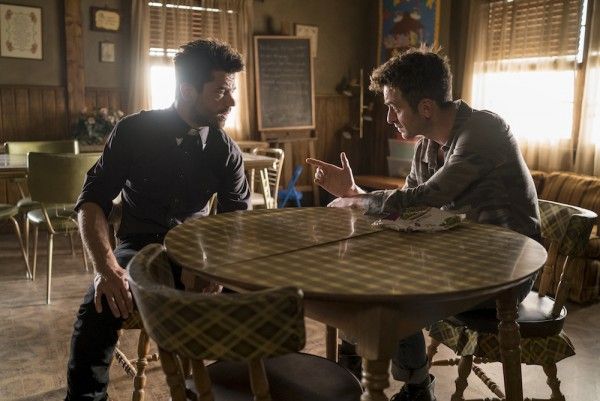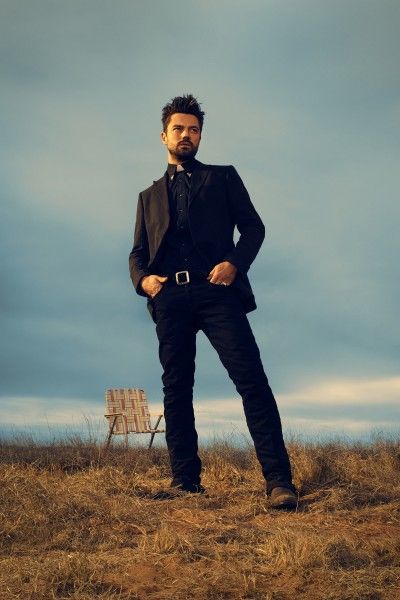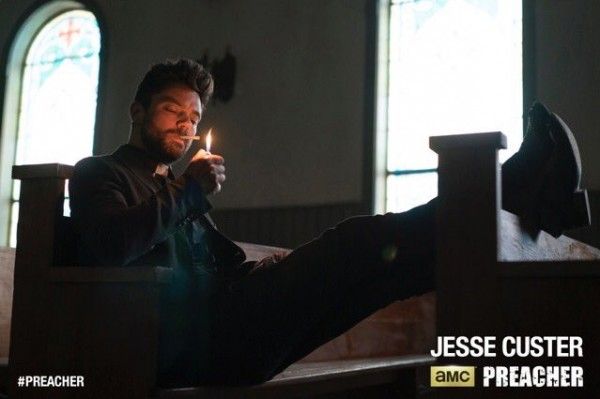One of my favorite shows on television is AMC’s Preacher, which is based on Garth Ennis and Steve Dillon’s comic series and brought to life by Seth Rogen, Evan Goldberg, and Sam Catlin. Loaded with crazy characters, graphic violence, sick humor, and really well done action set pieces, Preacher consistently surprises and it’s like nothing else on TV.
If you’re not familiar with the story, Preacher started off with an inaugural season that was essentially a prequel to events that happen throughout the violent graphic novel, which revolves around a preacher (Dominic Cooper) who has inherited a power called Genesis (a supernatural entity that has chosen his body as a host and gives him the power to make people do whatever he says). Now entering its third season, the show is using more of the source material as it follows Jesse Custer (Dominic Cooper), his girlfriend Tulip (Ruth Negga), and his friend and vampire Cassidy (Joseph Gilgun) as they search for God.
With Preacher season 3 starting up Sunday night on AMC, a few days ago I got to speak with Dominic Cooper. He talked about what it takes to make an episode of Preacher in eight shooting days, what the third season is about, how much he knows about each season going in, the unique nature of the show, the changing relationship between Tulip, Jesse and God, if he can leave the character he’s playing on set or does some of it come home with him, what would surprise people about the making of the show, and a lot more.
Check out what Dominic Cooper had to say below and tune in Sunday night if you want to see some fantastic television.
Collider: How are you doing today, sir?
DOMINIC COOPER: I'm doing real well. How are you doing?
I'm doing excellent. Let me start by saying how much I love the show. Thank you so much for giving me some time today.
COOPER: Thank you very much. Very kind of you. I'm glad you like it. Have you seen the first one in the third ... Did they send out screeners?
Yeah, I saw the first two episodes of season 3.
COOPER: Oh, cool.
I think the one thing that I'm so impressed with is how much you guys are able to accomplish on an eight-day shooting schedule. What the hell is it like being the scenes, trying to pull off a show with this kind of scope in such a short period of time?
COOPER: I mean, I'm always amazed by it. I think what it is, it's an incredible crew of people who work extraordinarily hard. And as I've always witnessed whenever I work in this country, I'm just like, it's just mind boggling. But they all do it because they love it, and they love the show, and they care about it and they know that we're ultimately trying to make something of such high quality in such a short space of time. And the more we've got to know our crew in New Orleans and the people there that all know each other so well now, it runs very efficiently and very smoothly. And that's the only way in which we can achieve it.
And each department now is sort of ... I suppose it's just, when something's been going on this long, when the same people have been working together for this amount of time, I think it's the only way you can start achieving this kind of level of quality in such a short space of time. And we're making it, I mean it sounds really, you know, eight days. And that with the amount of stunts ... And that with the amount of fight choreography, different locations, just the scale of it, in that space of time. It's like, I think, all down to the logistics, how they put the schedules together, and how the crew understands and works with one another. And how we interpret the scripts now and can kind of come up with ideas, and we know the characters so well that we can kind of ... Everything just starts happening much more smoothly after this amount of time. Which is why I'm very worried that we may be leaving that environment. Because of the necessity of the changing storyline. But it would be a big shift to lose the people that understand it so well on a day-to-day basis.
How much did you know about the arc of the season for season 3 before filming the first episode? Or are you sort of finding it out piecemeal, script by script?
COOPER: Well, I went into the writers' room quite early on. So I kind of got an understanding of where they thought it may be heading. And so I had an idea of which themes we were going to look into, and which characters. But really you have no ... And you start to understand it as it unfolds, where it's going to go. And who's going to be talked about, and which character becomes the forefront of the storyline. But no, you still ... And it also catches up to you so quickly. It's something, you know, that you're doing in eight days, every eight days. And you just had your head immersed in that, and then suddenly you're on to the next script coming in, and you have to start ... So you kind of, by the end, you have no idea and you're just suddenly seeing this script with incredible things that the crazed minds of the writers have come up with.
One of the things that I love about the show is that it's a blending of this fucked-up humor, violence, action. There's nothing like it on television.
COOPER: Yeah. I think that that's what they've managed to kind of, that's what they've managed to achieve so, so brilliantly. I think that they've got the mix, the level of that, so perfect. So that you can jump from being horrified by the gore and the danger of it, to finding it very endearing and finding the romance in it, and the love and the heartfelt human story. And then the utter, out and out violence. Then the comedy. You know. And I think that that's exactly what they ... And to where it really keeps finding itself.
And I think that's what has been intriguing about it as well, is that you can screen a show, really trying to find how extreme it can be. And what I think we've been finding out more and more is, it's never extreme enough. And the further you go with this stuff, the better, the more dangerous, and the more risks you take. Then it's more funny. Then it's more shocking. Then it's more ... It's just each and every step you take, you can go as far as you possibly think you can go. And I think that that's kind of always been the mantra from the writers' room to the fight sequences to every aspect of it. And the more we do that, the more successful it is.
It's also because, you know, now that you're in season 3, everyone has figured out, well how many action set pieces can we do in an episode. How many stunts can we do. You know, like, figuring out the infrastructure of making the show is just as challenging as writing it.
COOPER: Exactly. Exactly. Yeah. I mean, tuning the infrastructure and putting it together and how ... the choices one makes. But I think what we found a lot is that you ... The thing you've got to be careful about, the more extreme you become and the more outlandish and the more lunacy there is, and the more crazed it becomes, it is hard to put together a schedule where that can be shot in eight days. And I think that that's the balance. And that's down to good producing, and kind of just keeping an eye on how far those things can go. And a good balance between writers rooms and creatives and between AD and people on the ground that can understand, fathom, whether we can, whether it's achievable.
I don't want to get into the specifics of what happens in the first two episodes, but, what can you tease fans of the show about season 3?
COOPER: I think the biggest thing is about the family. And the different journey which we find, and how the three main protagonists go in their own directions. And their relationship becomes very complex and very difficult, and very impeded. And the thing we really, we found a lot about Jesse's past. What he's capable of, the dark side of him. Where Tulip's kind of inspired change in direction comes from, and where can we end up. And they're all very, very, very different places for each individual character.
When you are getting ready...before you started filming season 3, you've obviously played Jesse for a long time. You know, six months each season. My question is, are you re-watching the last few episodes of the last season, or are you doing anything to get back in that headspace? Or do you sort of own the character now, where you can just step onset and you're Jesse?
COOPER: It's funny, the reason why I still love playing him so much is he offers me ... I mean, there's always stuff I don't know about him. And there's always stuff that is revealed to me that I'm ... He's a man of many secrets and many dark shades. And a man who really is having a complex existence with his own personality and with his past, that he's thrown into, in this season. I know who he is. And I love playing him. But there's so much to him, that I still feel like I've only scratched the surface of who he is and what he's capable of. Every so often, you see a glimpse of it. And he can be quite terrifying, really. Because ultimately he is able to harness and hold and keep within him the word of God. Which ultimately means he's half good and half evil.
This is also the first season where we actually hear God's voice. Did you know that this was going to be the season where his voice would be finally heard? Because, you know, this could also be the beginning of a tighter relationship between God and Jesse.
COOPER: Yeah, I think that's exactly where this is going to be heading towards. We're going to head in a direction towards understanding how he can harness that power. What that power means, and where it's necessary and why it's necessary, in this world at this time. Actually, Tulip becomes much more ... has much more understanding of who he is, than Jesse does. And I think Jesse's quite envious of that relationship that unfolds, and I think that, yeah, he has to find out what his purpose is, in his ... and why he's able to hold onto this word. And what he can do for the greater good.
As an actor, when you're playing a character like Jesse, or you're making a feature film where you're playing somebody else, how much are you able to leave the character you're playing on set at the end of the day, and how much is like a piece of it coming home with you at night, while you're inhabiting the role?
COOPER: You can come in and out of it quite ... That's the one thing you are capable of doing, because otherwise, you'd just ... it would just be too much. So the one thing you learn, one thing I noticed that your brain learns so quickly is how you learn pages of dialogue and then forget it very quickly. And that happens after a week of working. So you also learn that you need to be able to ... I think it's one of the skills. Because in an environment especially like this one, there's so much going on. Everyone's jobs are so pivotal, so important. And you might not have quite the same focus or silence for ... Yeah, because there's just not as much time. And there's a lot going on. Sometimes we have three sets lining up all at once. So, I think the skill that we as actors need to achieve when you're going back to a character like this, or doing it, or playing this often, for this many hours, is to pick it up and put it down very quickly. Of course, there's always the elements of a person you're playing that stick to you and make you behave in certain ways. Maybe just your temperament or the speed in which you operate. Just because you're immersed in it for such long periods of time.
I've spoken to a lot of actors who say that if they're doing a very specific accent that's not very comfortable, that they will keep that accent 24/7 to stay in that thing. But otherwise, they can shut everything off.
COOPER: Sorry. They keep the accent but they don't-
Yeah, like the one thing that they will sometimes do is keep an accent, even off set. Just to like, if it's something that's really challenging them, to make sure that they have it.
COOPER: Something challenging them, then yeah I can understand. But I find it quite hard to do that as well, because you're having to communicate with others. So if I'm talking to ... If I have, you know, sort of a producer head on. Or like, I have to discuss things about a certain scene, or just props or a location or something that we need to change, and I need to have a proper conversation, it really puts people on edge, or it doesn't ... they don't quite know who you are, how to take you, when you start ... Or if I carried on speaking with a Texan accent while I was having those meetings ... Like, do you know, even if it was between takes, it's like when people come up to me in the street and ... Like in London, a few days ago when I was there. They went, oh, you're actually English. They couldn't really ... even within the States, they couldn't work out who I was at that point, so our conversation got quite awkward. Because it's weird enough ... I think I'd feel awkward keeping the accent the whole time when I'm at work. I don't know why, it's just something I've always felt a bid odd doing. If I continued it, I'd feel like I'm not being me. It's not me. I'm not ... Do you know what I mean? If I suddenly start-
Absolutely. And I think it also depends, because-
COOPER: It's peculiar.
I've spoken to a few different people. And you know, some of them , they put a tremendous amount of their heart and soul into a performance, almost too much. And they'll admit that they put too much in. I'll mention Andrew Garfield. He told me that when he did Silence or some of these other roles, or when he does Angels in America, that he disappears. To the point where he's really putting too much of himself in there. And then I've spoken to other people who say, it's literally an on and off switch. They can just turn it on, and then they can just turn it off.
COOPER: Yeah. I think people work very differently. And it also depends on the subject and the ... I mean, when you're doing a play like what you just mentioned about doing Angels in America, something as moving and as heartfelt and provoking, I think it's very important to be able to get away from that. Otherwise you're going to become, you know, an emotional wreck. Certainly if you're dealing with that subject matter. But I can understand it as well. And if it offers you a realism and a reality and you need to feel that immersed in it. But I think if you do, you just need to take care of which kind of jobs you take on, and the amount of time you spend doing them.
I think you should have a talk with Andrew. Because he'll fully admit that he's putting-
COOPER: Oh, yeah.
... he's putting too much of himself into it. For the people that are fans of Preacher, besides the challenges of making the show in eight days, what do you think people would be surprised to learn about the making of the show or what goes on behind the scenes?
COOPER: I think that they'd just be amazed by, again ... I think what it is, it's one of the nicest environments I've ever worked in. And people don't ... Amongst the stress, and the loss of hair, and the ever-graying beard, and the difficulty being away for a lot of people on that set from home, and the things that you give up in your life sometimes, for working away. But it's an extraordinarily happy set. And it's a very loving one. And a lot of people that miss each other when it ends, because we're in a very intense environment for a long period of time, in a wonderful place in the world. And I think we've all met an extraordinary group of friends. And you'd be amazed, I think, sometimes with how violent or how nasty or how dark sometimes it gets, behind, as soon as cut is called, as soon as the camera stops rolling, there's normally fits of hysteria and a lot of laughter, and people kind of being very supportive and having a ... Ultimately, knowing that it is, we're making a TV show, and it's a fun TV show, and that also while we're doing it and while we're working 16-hour days, let's also really enjoy each other's company, have a laugh. Because that's ultimately what it needs, that needs to feed into the show as well.
Listen, I could ask you a million other things. But I mean it sincerely. I really, truly love the show, and hope you guys get picked up for many more seasons.
COOPER: Thank you so much. Thank you.
Have a great day.
COOPER: You too. Bye-bye.

